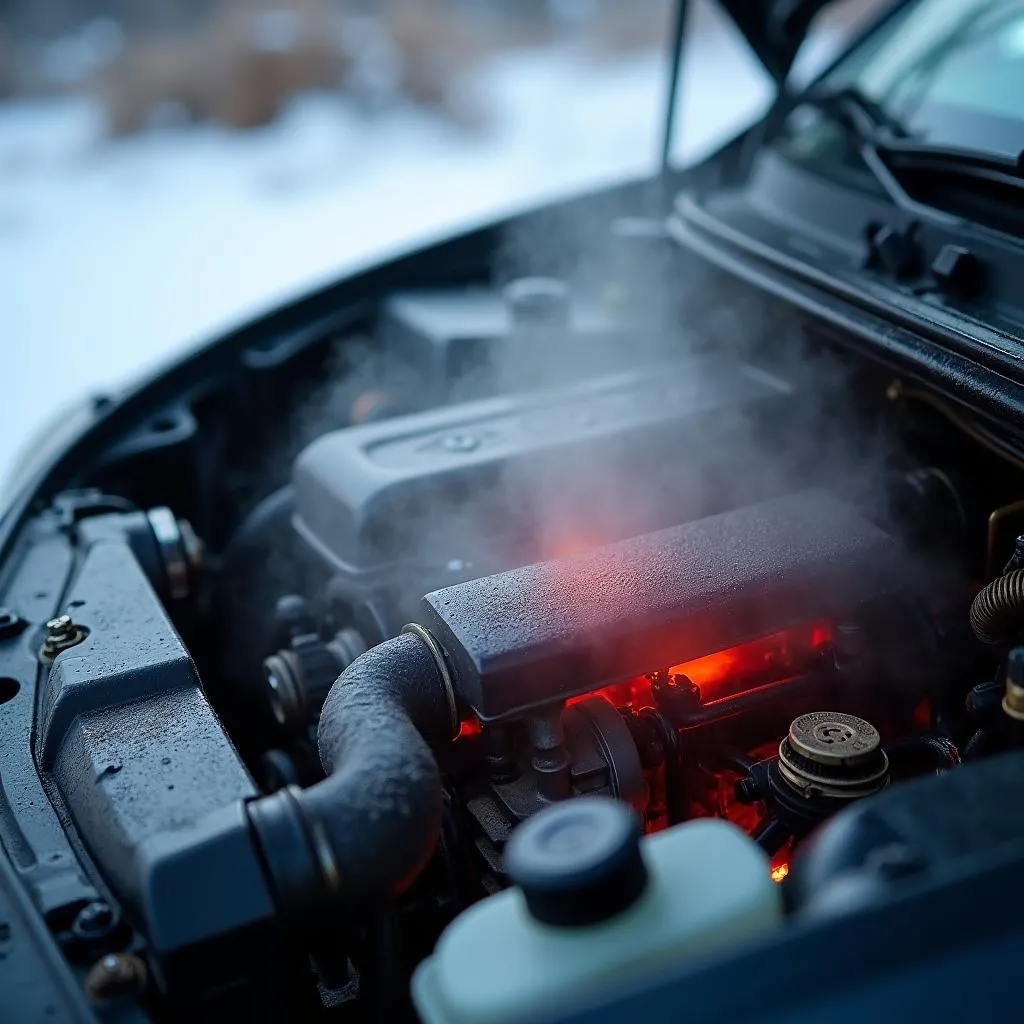“It’s freezing outside, why is my car overheating?” If you’ve found yourself asking this perplexing question, you’re not alone. It seems counterintuitive, but cars can, and do, overheat in winter. Just ask John, a Chicago resident who experienced this very issue last December. He was driving his 2018 Ford Focus through a snowstorm when suddenly, the dreaded temperature gauge started creeping up.
The Winter Overheating Paradox: Understanding the ‘Why’
While we often associate overheating with scorching summer days, your car’s cooling system works just as hard in winter, albeit for different reasons. Understanding why your Car Overheats In Winter requires a shift in perspective. It’s not just about ambient temperature; it’s about the intricate interplay of various components and how winter conditions can impact their performance.
From a mechanic’s perspective, winter throws a curveball at your car’s cooling system. “People often forget that the cooling system isn’t just about preventing overheating in summer,” says Michael Stevenson, a veteran mechanic with over 20 years of experience. “It’s about maintaining a consistent engine operating temperature year-round.”
Decoding the Winter Overheating Puzzle
Let’s break down the most common culprits behind your car’s winter overheating woes:
1. A Clogged Cooling System: The Silent Saboteur
Imagine your car’s cooling system as a network of waterways. When these waterways become obstructed with debris like dirt, rust, or even insects, it restricts the flow of coolant—the lifeblood of your engine’s temperature control. This restriction can lead to localized hot spots, causing your engine to overheat even in winter.
2. A Failing Thermostat: The Gatekeeper Gone Wrong
Think of your car’s thermostat as a gatekeeper, regulating coolant flow between the engine and the radiator. A stuck closed thermostat prevents coolant circulation, leading to rapid overheating, especially noticeable in colder temperatures.
3. A Worn-Out Water Pump: The Circulation Compromiser
The water pump is the heart of your cooling system, responsible for circulating coolant throughout the engine and radiator. A failing water pump, often indicated by a whining noise, compromises coolant flow, increasing the risk of overheating regardless of the season.
4. Low Coolant Level: The Deceptively Simple Cause
This one seems obvious, right? Yet, low coolant levels are a surprisingly common culprit behind winter overheating. Leaks, often exacerbated by freezing temperatures and pressure changes, can gradually deplete coolant, leaving your engine vulnerable to overheating.
 Car engine overheating in winter
Car engine overheating in winter
Recognizing the Warning Signs
Ignoring the warning signs of an overheating car is like ignoring a ticking time bomb. Here’s what to look for:
- Temperature Gauge Spikes: A sudden or gradual climb in the temperature gauge beyond the normal range is a clear red flag.
- Steam, Smoke, and Strange Smells: Steam billowing from under the hood, accompanied by a sweet, syrupy smell, often indicates a coolant leak.
- Engine Performance Issues: Overheating can manifest as a loss of power, engine sputtering, or even complete engine seizure in extreme cases.
Navigating a Winter Overheat: What To Do
If your car overheats, don’t panic. Pull over to a safe location as soon as possible and turn off the engine.
Important: Never remove the radiator cap while the engine is hot. The pressure within the system can cause severe burns.
Preventing Winter Overheating: Proactive Measures
The best way to deal with winter overheating is to prevent it altogether. Here are some proactive steps:
- Regular Maintenance is Key: Just like you wouldn’t skip your annual doctor’s appointment, don’t neglect your car’s scheduled maintenance. This includes regular coolant flushes and inspections of the entire cooling system.
- Know Your Coolant: Use the correct type and concentration of coolant for your car. Refer to your owner’s manual or consult a trusted mechanic.
- Winterize Your Car: Consider a professional winterization service that includes checking the cooling system for leaks, inspecting belts and hoses, and topping off fluids.
 Mechanic inspecting a car's cooling system during winter.
Mechanic inspecting a car's cooling system during winter.
Frequently Asked Questions:
Q: Can I add water to my coolant in winter?
A: While adding water might seem like a quick fix, it’s not recommended, especially in winter. Water freezes at a much higher temperature than coolant, potentially causing damage to your engine and cooling system.
Q: How often should I flush my coolant?
A: Consult your owner’s manual for specific recommendations, but a good rule of thumb is every 2 years or 30,000 miles.
Q: Can extreme cold weather damage my car battery?
A: Yes, cold weather can significantly reduce battery performance. It’s a good idea to have your battery tested before winter arrives.
Q: How important are winter tires for driving in snowy conditions?
A: Winter tires provide superior traction and handling on snow and ice compared to all-season tires, significantly improving safety.
Explore More:
- [Link to article about car battery maintenance in winter]
- [Link to article about choosing the right winter tires]
Need Expert Help with Your Car’s Diagnostics?
Don’t let car troubles leave you stranded. Contact us on WhatsApp at +84767531508 for immediate assistance with Diagnostics Tool installation and 24/7 support from our expert automotive technicians.
We’re here to help you keep your car running smoothly, no matter the season.
